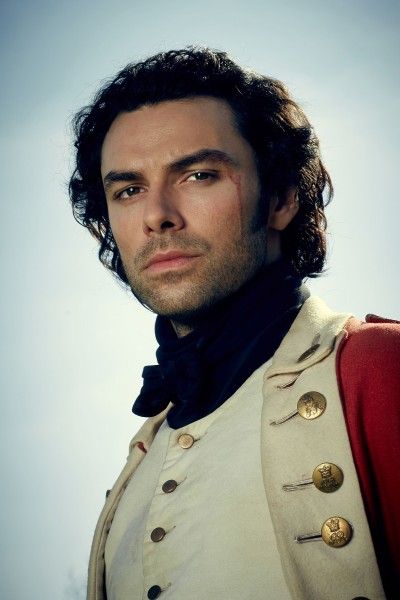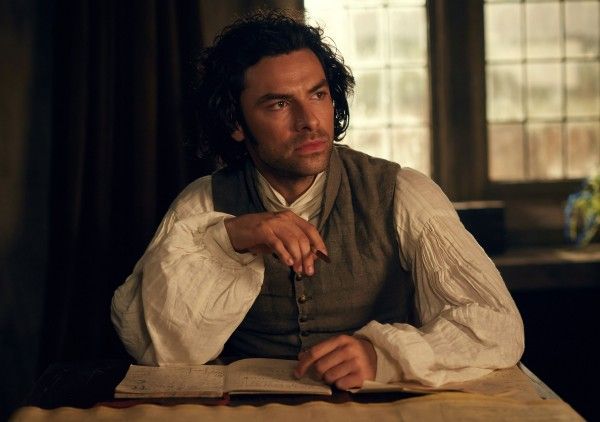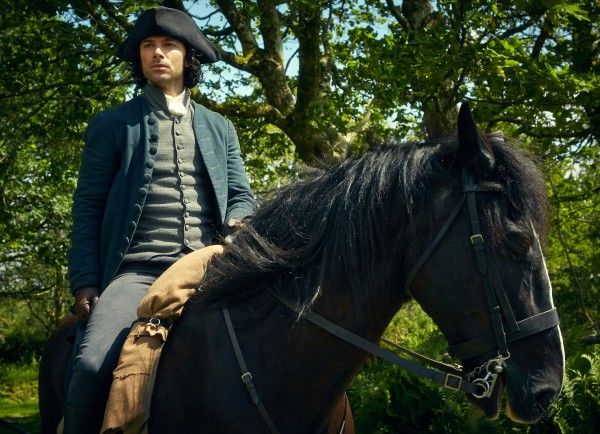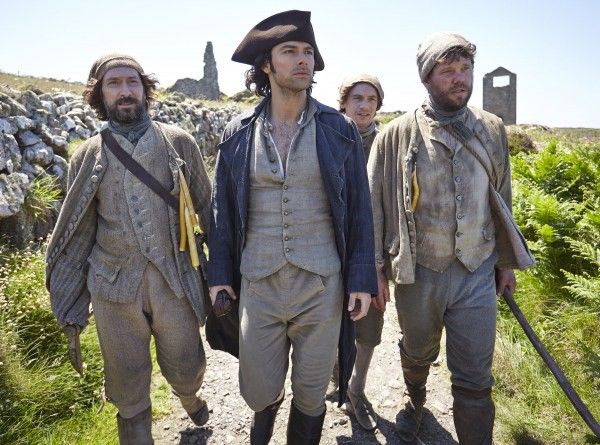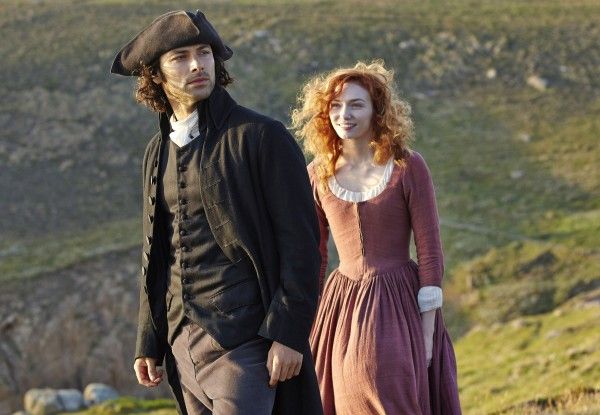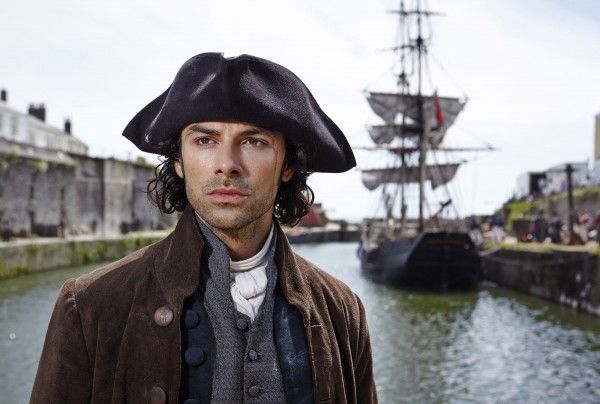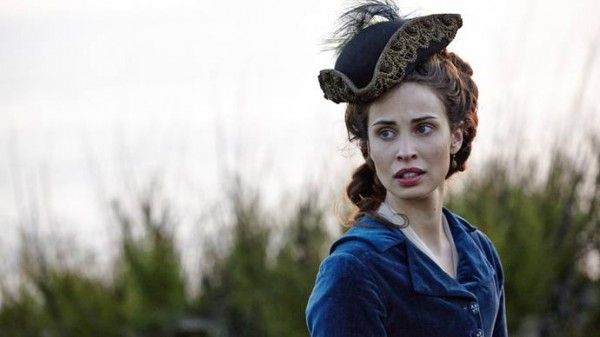In Poldark, airing on Masterpiece on PBS, Ross Poldark (Aidan Turner) is a redcoat who returns to Cornwall after the American Revolutionary War, only to discover that his life is nothing like he remembered, as his father is dead, his lands are ruined, and his true love is about to marry his first cousin. Based on a beloved series of novels by Winston Graham and first introduced to television audiences almost 40 years ago, with Robin Ellis (who also makes an appearance in this version) in the title role, the gallant captain rides again, with even more spectacular action, adventure and romance than ever before.
During this exclusive interview with Collider, actor Aidan Turner talked about why this project appealed to him, being described as the next Downton Abbey, that this story has enough material to continue for five seasons, wanting to approach the role with a fresh perspective, what it was like to have the original Poldark on set, and why this is so relatable to modern-day audiences.
Collider: How did this come about?
AIDAN TURNER: It was quite strange for me. I’d just come back from New Zealand, after spending so much time out there. They were so welcoming, brilliant and lovely with all of the cast members in New Zealand, but it was so far away from home. Even finding that little window to talk to people was quite tiny. You would have a couple hours during your day or morning to contact your friends and family, and then when that goes, that’s gone. That becomes a bit tiresome, after awhile. So, coming back to the UK, it felt like home. It wasn’t a big adjustment, at all. It was quite a relief, actually. It was a great job and it was lovely to be there, but two years was a long time.
So, how did this come about? I don’t know. It just did, really fast. I came back and I was auditioning and meeting people, but I was being very careful about what I would do next. I was reading a lot of things, and this just happened. It came really quickly. The BBC sent me the first two of Winston Graham’s novels, that are covered in the first [season], and the first four or six of Debbie Horsfield’s scripts. It came in November or December of the year before last, and it was just one of those things where I read it and immediately connected with it and thought, “This is something I want to do.”
I had worked with the BBC before, and it would be in the UK and close to home. Everything just seemed to work out. I just saw something in this character and thought he’d be interesting to play. He’s strong, he’s a man of principle, and his moral compass seems to be pointed in the right direction, but at the same time, he’s not dull and he’s not just this benevolent, saintly character. He has a certain renegade thing about him, and a lawlessness that I like. He doesn’t like authority of any kind. He’s a bit of a rebel. Everything just seemed to work, and it seemed to make sense to do it. I think I would have been kicking myself, if I’d have said no.
This is your first time back on TV since Being Human. Did you want to make sure you did something very different, or would you have done something in a similar genre, if it spoke to you the way that this did?
TURNER: Probably not, is the honest answer to that. I wanted to move on and do something different. Every actor wants to change things up a bit. You don’t want to be pigeonholed, and not just because of what the industry might think, but it maybe does become a bit dull when you’ve covered that territory. Getting back into something like that just didn’t appeal to me. It wasn’t on my radar to do something like that, at all. I was looking out for different projects. That’s why you have good agents and management and people looking out for you. Whether offers for supernatural stuff were coming in or not, I don’t know. It certainly wasn’t landing in my email inbox.
How do you feel about your time on Being Human? Was it a meaningful experience for you?
TURNER: I have such fond memories from that show. It’s a show that we’re all really proud of. It’s the show that never really should have made it. It’s the little show that did. The premise is insane, with a ghost, a vampire and a werewolf sharing a flat in Bristol. When I heard about it, I was like, “Pass.” But then, I thought I’d read it, and I’m glad I did. The show never had an ego. We were just doing what we loved doing. We never knew how successful it would be until it was over, to be honest. Once we became aware of the fact that it was getting popular, and the rights were bought in America and they were doing it, we thought, “This is amazing! So, let’s end it.” Sometimes, if you love something, give it away. It was the right time to get out, for all of us. I think the American show ran longer, and they covered more story. It’s a great thing. Toby Whithouse, the creator, is an incredible guy who’s really talented. It’s a show that we’re all really proud of.
When you hear people calling Poldark the next Downton Abbey, is that scary?
TURNER: Terrifying! It makes you nervous, to a degree, but then you realize that the show is really nothing like Downton. Whether the press want to hear that or not, or PBS are going to start throwing bricks at me from across the room, I don’t know because they obviously want the show to be as popular and successful. But, it’s a very different time. We’re dealing with 18th century Cornwall, which is Southwest England. At the time, that was almost its own little country. Downton Abbey is early 20th century, and it’s just a very different show. So, I don’t know. Hearing those kinds of comparisons, it’s nice that people put you in the same category, but I don’t know if it’s very fair. It puts a lot of pressure on everybody involved. Downton Abbey was the precedent for that kind of success. It’s the most popular TV show on the planet, with Game of Thrones. I don’t think we would make those comparisons. Not yet, anyway.
You have seven episodes for Season 1, but there are 13 books and talk about doing five seasons. When you signed on, were you aware that you could be playing this character for awhile?
TURNER: That’s the great thing about the internet and Wikipedia. You can very easily check out what’s going on. When this came in, one of the very first things I did was Google Winston Graham and to find out what he had done and how many of these books he had done for the stories that we’re covering. And then, it was like, “Woah, there could be five seasons in this.” That’s slightly terrifying. He’s done has job already and succeeded, and we’ve just started. To get to five seasons of anything, these days, is difficult, as everyone knows. Even if you have a successful show, it might not get that far. That’s more intimidating than the comparison to Downton Abbey. The fact that Winston has done such an incredible job, we have to live up to that now, so the ball is in our court, on this one.
This show has a built-in history, having been done previously. Did you think about that and look at it, at all, or did you want to approach this from a fresh perspective?
TURNER: I didn’t watch it, and that was a conscious thought because it’s readily available through different mediums. I just didn’t think it would serve me to watch it. I wanted to find Ross, myself, and I wanted this to be my own journey. I heard, by all accounts, that Robin Ellis’ performance was pretty brilliant, and the show was super popular. I think I would have found that slightly intimidating. I also didn’t want to feel like I was mimicking or copying someone else’s performance, whether it’s subconscious or not. Certainly, I’d be interested to watch it when we’re done with what we do. And I’ve met Robin. He plays a small role in our series. I’m very interested to see what they did with the show and make those comparisons. So, at the time of my research and what I was getting myself into, it just felt like it wouldn’t have been the best thing for me. But I get the way that many actors just would have consumed that immediately, for many good reasons. I just didn’t think that would work for me. You can’t un-know it once you know it. It might benefit some actors, and that’s the way they work, but for me, I wanted to find this guy myself, see what I could come up with, and work with it. We have a great team. Debbie Horsfield’s adaptations are fantastic. All the work is already there. Winston has done the work for us. If you need to research, you can read his books. That’s where its’ coming from. I just didn’t think there was a lot to gain from watching the series. That being said, it was very popular and it was very good, so I don’t dismiss it.
What was it like to have Robin Ellis on set?
TURNER: Mad! Crazy! Robin is a lovely guy. He’s really calm and really cool and really collected. He’s got a lovely sensibility about him. I don’t think he would ever say, “Here’s some tips. Here’s what I did, back in the day, during this scene.” I had some lovely moments with him on set. He plays Reverend Halse, who is judge and jury in the local courts. There’s one scene where I stand up for a character – a young guy, called Jim Carter – and I’m fighting his case. We’re having it out, and we’re having this screaming match at each other. I went at him quite hard, stormed out of the courtroom, slammed the door, and a couple of people applauded, as part of the scene. And then, when I crept back in, I wanted to go, “So, what was I like?” He just lowered his glasses, and he had the cape and the wig on, and gave me a little wink. And I thought, “Shit, yes! I’ve got the sign of approval from the original Ross Poldark.” That was enough for me. It was a lovely moment. I’ll never forget it.
For people who don’t know the books and aren’t familiar with the original series, what can you say about who Ross Poldark is?
TURNER: Well, the series starts with Ross coming back from the American Revolutionary War. His father enlisted him because he was getting in quite a lot of trouble. He was poaching, rioting and smuggling, and he was basically headed for the noose or jail, and a prison sentence, at that time, was basically death. If you got a couple of years, you probably wouldn’t survive it. They were horrible dank, dark and disgusting places that were rife with disease. You’d be better off getting the noose, in some ways. So, when he comes back to Cornwall, the place has really changed. His family’s business is mining, and that’s shutting down, all the time. His father has died while he’s been away, but he didn’t know. Nobody told him or wrote to him. He came home and his inheritance is in tatters, his land is a mess, the house that he owns is falling apart, the tenants are leaving, and it’s horrible.
The one thing that’s keeping him going is his beloved Elizabeth, who he’s promised his life to. Upon returning, he thinks he’s going to marry her and that will make everything okay. And then, he finds out that his cousin and best friend, who are one person named Francis, jumped in there before him. So, Ross’ life is in pieces. But, that’s what I love about this character. He very quickly pulls himself up by his bootstrap. He’s got a lot of determination, and he makes Cornwall work for him. His Uncle Charles, played by Warren Clarke, makes him a very nice offer to set him up in London, paying for his education and accommodations and anything else he needs, but he decides not to do it because Cornwall is where his heart is and where his roots are, and he feels strongly about that. He’s a man of principle. He’s a strong character. He’s a real hero, and hopefully people will identify with that, immediately. He’s the type of person who feels duty-bound to help people less privileged than him, and I like that attribute.
Would you say this is very relatable to modern-day audiences?
TURNER: Yeah, these aren’t just 18th century topics. The story of love is a story that we’ve been playing out for years. It can manifest in the most unpredictable and uncertain ways, and it can make one behave completely irrationally and incoherently, all because finding that one person can change your life and make it infinitely better. These are stories we always want to hear about, I think.
How would you describe the relationship between Ross and Demelza?
TURNER: It’s a funny one. I don’t think Ross ever expected to marry someone like Demelza. He would have seen himself with someone from the aristocracy or someone from the upper social circles. She really surprises him. I think he sees a lot of himself in Demelza. She’s the outsider, she’s a rebel and she doesn’t take any shit, but she’s kind and she’s generous and she sees through people. It’s not about the social barriers and borders. It’s about who you are, as a person. She doesn’t have an agenda. She’s real. She’s somebody Ross really relates to, and I think he’s surprised by her. She amuses him. She’s funny, and she’s beautiful. I can see how you could fall in love with somebody like her.
Is it surreal to film something so epic, in these costumes, acting out this big, sweeping moments?
TURNER: Yeah, we do a very strange job. You put on a costume and you’re on set, and sometimes you look around and you don’t see the film crew. You just see other actors wearing the same period costume, and the set looks like that, and you couldn’t be closer to that world. It’s a mad thing. You do pinch yourself sometimes. There are loads of those moments. But then, as quickly as they happen, they disappear, and then you get into doing what you do and you get on with it. You forget about those things. It doesn’t help to concentrate on the kookiness and wackiness of our job sometimes. You just have to live in the moment.
Poldark airs on Sunday nights on Masterpiece on PBS.


